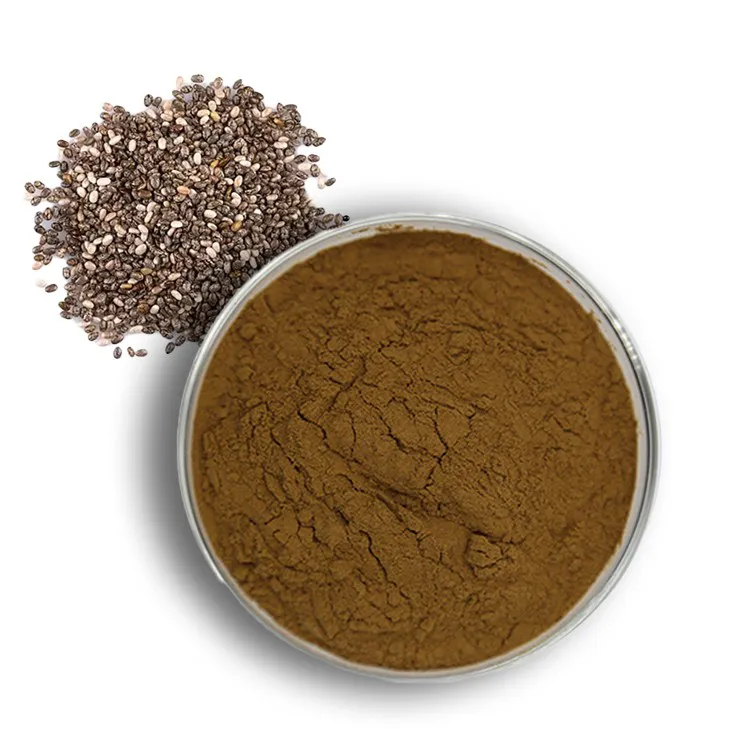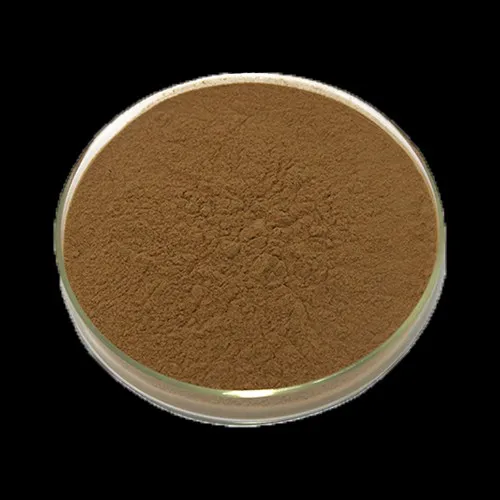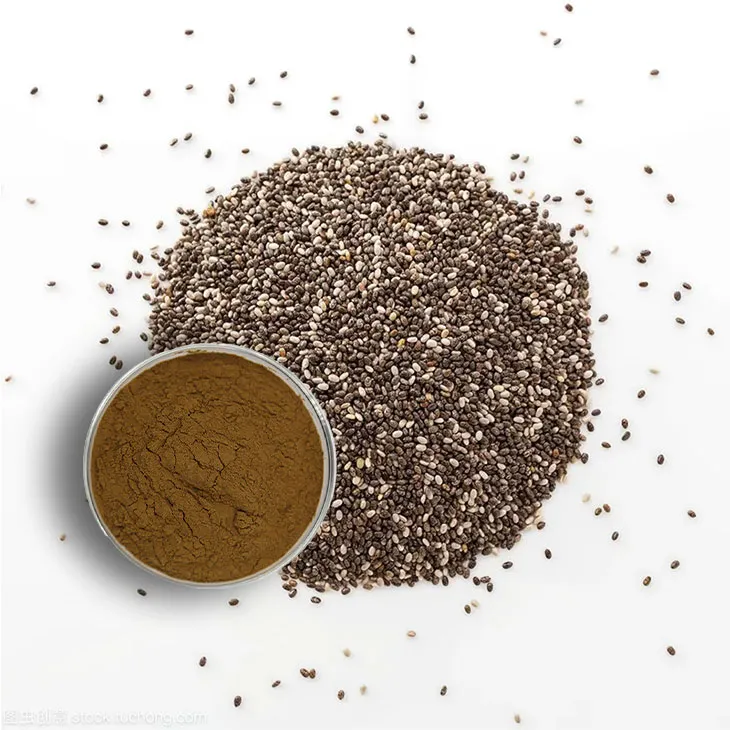- 0086-571-85302990
- sales@greenskybio.com
Benefits of Chia Seed Powder in Cattle Feed.
2024-11-11

Introduction
In the realm of cattle farming, the quality of feed plays a crucial role in the health, growth, and productivity of cows. Chia Seed Powder has recently gained significant attention as a potential addition to cattle feed. This article will explore the various benefits that Chia Seed Powder can offer to cattle.

Nutrient - Rich Composition
Chia Seed Powder is a powerhouse of nutrients that can significantly enhance the diet of cattle.
Omega - 3 Fatty Acids
One of the most notable components of chia seed powder is its high content of omega - 3 fatty acids. These fatty acids are essential for the overall well - being of cows.
- Reduction of Inflammation: Omega - 3 fatty acids play a vital role in reducing inflammation within the animals' bodies. Inflammation can be caused by various factors such as infections, stress, or poor diet. By reducing inflammation, cows are likely to experience less pain and discomfort, which can lead to improved behavior and overall health. For example, cows with reduced inflammation may be more active, show better mobility, and have a healthier appearance.
- Enhanced Immune Function: These fatty acids also contribute to a stronger immune system. A robust immune system is essential for cows to fend off diseases and infections. Cows with better immune function are less likely to fall ill, reducing the need for veterinary treatments and medications. This not only saves costs for farmers but also ensures the continuous productivity of the cattle.
High - Quality Proteins
Chia seed powder contains high - quality proteins that are beneficial for cattle.
- Muscle Development and Growth: Proteins are the building blocks of muscle tissue. In cattle, the presence of high - quality proteins from chia seed powder can promote better muscle development. This is especially important for young calves, as it helps them grow into strong and healthy adult cows. Stronger muscles also contribute to better locomotion and the ability to carry out normal activities such as grazing and moving around the pasture.
- Reproductive Health: Adequate protein intake is also crucial for reproductive health in cows. It can improve fertility rates, ensuring successful breeding and calving. Cows with proper protein nutrition are more likely to conceive, carry their calves to full term, and give birth to healthy offspring.
Fiber Content
The fiber content in chia seed powder is another significant aspect.
- Improved Digestive System: Fiber is essential for maintaining a healthy digestive system in cows. Chia seed powder's fiber helps to regulate the digestive process, preventing issues such as constipation or diarrhea. It also promotes the growth of beneficial gut bacteria, which play a role in breaking down feed and extracting nutrients more efficiently.
- Enhanced Feed Utilization: A well - functioning digestive system leads to more efficient feed utilization. Cows are able to extract more nutrients from the feed they consume, which means that less feed is wasted. This is not only cost - effective for farmers but also beneficial for the environment, as it reduces the amount of feed that needs to be produced and the associated environmental impact.
- Better Manure Quality: The improved digestive process also results in better - quality manure. High - quality manure is rich in nutrients and can be used as a natural fertilizer in farming. It can improve soil fertility, which in turn benefits the growth of pasture grass and other crops.

Economic and Environmental Benefits
The use of chia seed powder in cattle feed also brings about certain economic and environmental advantages.
Economic Benefits
For farmers, the addition of chia seed powder to cattle feed can have several positive economic impacts.
- Reduced Veterinary Costs: As mentioned earlier, the omega - 3 fatty acids and high - quality proteins in chia seed powder can enhance the cows' immune system and overall health. This leads to a reduced incidence of diseases and infections, thereby cutting down on veterinary costs. Fewer sick cows mean less money spent on medications, treatments, and veterinary consultations.
- Improved Productivity: Cows that are healthier and better - nourished are more productive. They can produce more milk, have better growth rates, and may even have a longer productive lifespan. For dairy farmers, increased milk production can directly translate into higher revenues. In the case of beef cattle, better growth rates mean more meat production, which is also economically beneficial.
- Cost - Effective Feed Option: Although chia seed powder may seem like an additional cost initially, its long - term benefits can make it a cost - effective option. The improved feed utilization means that less feed is required overall. Additionally, the reduction in veterinary costs and the increase in productivity can offset the cost of adding chia seed powder to the feed.
Environmental Benefits
There are also environmental benefits associated with using chia seed powder in cattle feed.
- Reduced Feed Production: Since cows can utilize feed more efficiently when chia seed powder is added to their diet, less feed needs to be produced. This reduces the amount of land, water, and other resources required for feed production. For example, less acreage of land needs to be dedicated to growing feed crops, which can be beneficial for conservation efforts.
- Improved Soil Health: The better - quality manure produced by cows fed with chia seed powder can enhance soil health. As the manure is rich in nutrients, it enriches the soil, improves soil structure, and promotes the growth of plants. This can lead to a more sustainable farming system, as healthy soil is essential for long - term agricultural productivity.

Challenges and Considerations
While the benefits of chia seed powder in cattle feed are numerous, there are also some challenges and considerations that farmers need to be aware of.
Cost and Availability
Chia seed powder can be relatively expensive compared to traditional cattle feed ingredients. Additionally, its availability may be limited in some regions. Farmers need to carefully consider the cost - benefit ratio and ensure that they can source a consistent supply of chia seed powder.
Proper Dosage and Formulation
Determining the proper dosage of chia seed powder in cattle feed is crucial. Too much or too little can have adverse effects on the cows' health and performance. It is also important to ensure that the chia seed powder is properly formulated with other feed ingredients to achieve the best results. This may require some experimentation and consultation with animal nutrition experts.
Quality Control
As with any feed ingredient, quality control is essential. Farmers need to ensure that the chia seed powder they purchase is of high quality, free from contaminants, and has been processed and stored properly. Poor - quality chia seed powder can pose risks to the cows' health and may not provide the expected benefits.
Conclusion
In conclusion, chia seed powder has the potential to offer a wide range of benefits to cattle when included in their feed. Its nutrient - rich composition, including omega - 3 fatty acids, high - quality proteins, and fiber, can enhance the health, growth, and productivity of cows. Additionally, there are economic and environmental benefits associated with its use. However, farmers need to be aware of the challenges such as cost, availability, proper dosage, and quality control. With proper management and consideration, chia seed powder can be a valuable addition to cattle feed, contributing to a more sustainable and productive cattle farming industry.
FAQ:
1. What are the main nutrients in chia seed powder that are beneficial to cattle?
Chia seed powder is rich in omega - 3 fatty acids, high - quality proteins and fiber. Omega - 3 fatty acids can enhance the overall health of cows by reducing inflammation. The high - quality proteins promote better muscle development and growth in cattle, and the fiber can improve the cows' digestive system.
2. How does chia seed powder improve the digestive system of cows?
The fiber content in chia seed powder is beneficial for the digestive system of cows. It helps in making the digestion process more efficient, which in turn leads to better utilization of feed. This also has a positive impact on the quality of manure produced by the cows.
3. Can chia seed powder really enhance the muscle development of cattle?
Yes, it can. Chia seed powder contains high - quality proteins. Proteins are essential for building and repairing tissues, including muscles. So, when included in cattle feed, the high - quality proteins in chia seed powder can promote better muscle development and growth in cattle.
4. In what way do omega - 3 fatty acids in chia seed powder benefit cows?
Omega - 3 fatty acids in chia seed powder play a role in reducing inflammation in the bodies of cows. By reducing inflammation, it helps in enhancing the overall health of the cows.
5. How does the use of chia seed powder in cattle feed affect feed utilization?
Since chia seed powder has a good fiber content which improves the digestive system of cows, it leads to more efficient feed utilization. Cows are able to break down and absorb the nutrients from the feed more effectively when chia seed powder is added to their diet.
Related literature
- The Role of Nutritional Supplements in Cattle Health"
- "Beneficial Additives in Livestock Feed: A Comprehensive Review"
- "Omega - 3 Fatty Acids and Their Impact on Farm Animal Health"
- ▶ Hesperidin
- ▶ citrus bioflavonoids
- ▶ plant extract
- ▶ lycopene
- ▶ Diosmin
- ▶ Grape seed extract
- ▶ Sea buckthorn Juice Powder
- ▶ Beetroot powder
- ▶ Hops Extract
- ▶ Artichoke Extract
- ▶ Reishi mushroom extract
- ▶ Astaxanthin
- ▶ Green Tea Extract
- ▶ Curcumin Extract
- ▶ Horse Chestnut Extract
- ▶ Other Problems
- ▶ Boswellia Serrata Extract
- ▶ Resveratrol Extract
- ▶ Marigold Extract
- ▶ Grape Leaf Extract
- ▶ blog3
-
High purity olive leaf extract
2024-11-11
-
Lavender oil extraction method
2024-11-11
-
100% organic virgin sea buckthorn fruit oil
2024-11-11
-
Lotus leaf extract powder factory in China
2024-11-11
-
China aged garlic extract supplier
2024-11-11
-
Deer antler extract powder manufacturer
2024-11-11
-
Saw palmetto extract vs whole herb
2024-11-11
-
Mulberry Extract
2024-11-11
-
Cassia Seed Extract
2024-11-11
-
Wheat Germ Extract
2024-11-11
-
Lycopene
2024-11-11
-
Cat Claw Extract
2024-11-11
-
Phellodendron Extract
2024-11-11
-
Saw Palmetto Extract
2024-11-11
-
Lotus leaf extract
2024-11-11
-
Shikonin
2024-11-11
-
Rose Hip Extract
2024-11-11





















